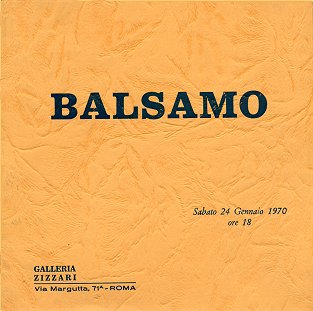January 1970, ed. "Zizzari" Gallery. |
||
"Not available-out of print"

|
The Catalogue is now on line
Catalogue essay This does not mean that the artist wants to totally annul the
objective dimension of nature: we shall say that nature represents
a pretext and a justification to fix an abstractive process, whose
task is to create the reversibility of formal values. This is very
clearly expressed in 'Autumn landscape' (1967) where the signs
of figurativity are transformed in non - figurative equivalents. A
similar contraction of the original values in new acceptations can
be also found in the expressive freedom of colour which shows a
tendency to exclude itself from the traps of the local tone to be
determined as pure autonomous organism directed towards the
armony which is surely independent. Therefore, as there the common notions affered by nature,
which could lead the theme of the composition towards the
rigorous sphere of abstraction, the conseguence is that
Balsamo's painting is essentially centered on the eleboration and
trasformation of the object into pure form: a form which hides the
didactic characters of the sensible appearance but doesn't
destroy its intimate essence. However, even if he is immersed in the rigid climate of formal
reductions every now and then the artist returns to his emotional
skies and dilutes his lyrical breath in the evidence of well known
reality: here we have the sudden, we could almost say
uncontrolled yield of some still lives. Full of elements, made livid
with colour, embedded and plugged in a quick rhythm, ground by
the contractions of an 'autre' cubist geometry or again laid in
widespread chromatic assonance, or limited in that measure, so
typical of CÚzanne which solves the image in the compactness of
the objects, collected in a single figural nucleos. That landscape too comes from the bottom of that poetic
plenitude and shows its sibstance in the explicit narrative
statements that the distilled, dramatic play of light and shadow
and the lava of clotted matter lead to effects which are not totally
descriptive. This happens with all compositions with flowers,
open to intense brilliance, rediced to an explosion of colour. The painter's intelligence is consumed in a gradual, conscious
trial of the essential. It must be said then that the continuous,
inexhausted elaboration of the theme - which we can easily trace,
especially in the more recent works - open the doors to a result
which clearly reduces the role of image. Through the use of areas
and masses and slow, descending strokes (both in tone and in
the presence of matter) the landscape discovers its internal
humors, attains an independent dimension, not subversive, which
can be reflected, without prejudices, in the identified and
identifiable values of reality. When the process of direct
perception has been rebuilt and rectified thanks to the immediacy
of the artistic practive, it is possible to determine the
interpretative values of reality. It is not only form which concludes expression, but also colour
with its tonal layers in an alternating balance of luminous
densities. And matter, again, heavy and perennial, which
gravitates on the masses and assimilates them, reducing the
space of composition to the most extreme and legitimete formal
measure. | ||